Category: Press Releases
-
Gaza will not kneel
27 December 2011 | Palestine’s Youth – Local Initiative – the Popular Resistance Activists, Gaza – Palestine Twenty-three consecutive days of horrendous attacks on the Gaza Strip by the IOF (Israeli Occupation Forces) left more than 1500 Palestinians dead and many more injured. Most of the victims were women, children and elderly people. According to the…
-
Open letter from Gaza: Three years after the massacre, justice or nothing!
27 December 2011 | Besieged Gaza, Occupied Palestine We, Palestinians of Gaza, 3 years on from the 22-day long massacre in Israel’s operation ‘Cast Lead’, are calling on international civil society to make 2012 the year when solidarity with us in Palestine captures the spark of the revolutions around the Arab world and never looks…
-
Your help needed: Donating olive trees this holiday season
19 December 2011 | International Solidarity Movement, West Bank As we creep up to Christmas and are seeing more and more trees appear in houses and high street windows, while we debate when to put up our own, if at all this year, I ask you all to give consideration to a much more special…



